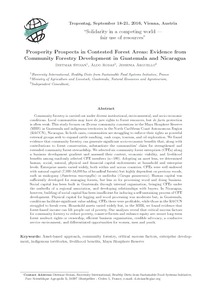Principles, criteria and indicators: applying Ockham’s Razor to the people-forestry link
This concept paper addresses those elements in the people-forest interface which we perceive as critical to sustainable forest management, based on our own training and experience, as well as two field tests of the conceptual framework (in Kalimantan and Côte d'Ivoire ). Initially, we define our use of important terms, like sustainability, well being/needs, and people; and make clear some of our assumptions.
Property rights and participatory forest management: an overview
This paper is an overview of participatory forest management in relation with property rights issue. It highlights the difficulty in defining property rights. Although the issues presented are applicable throughout tropical Asia, albeit less so in the Pacific, this paper is based primarily on the author's experience in Indonesia, and almost all of examples are from indonesia. This paper discuss the diversity and changing nature of property rights and continues with a discussion on the issue of communities demanding the rights and possible responses of the government.
Proses pembelajaran (learning lessons) promosi sertifikasi hutan dan pengendalian penebangan liar di Indonesia: September 2003 sampai June 2006
Prosperity prospects in contested forest areas: evidence from community forestry development in Guatemala and Nicaragua
Tropentag, September 18-21, 2016, Vienna, Austria
“Solidarity in a competing world —
fair use of resources”
Prosperity Prospects in Contested Forest Areas: Evidence from
Community Forestry Development in Guatemala and Nicaragua
Dietmar Stoian
1
, Aldo Rodas
2
, Jessenia Arguello
3
1
Bioversity International, Healthy Diets from Sustainable Food Systems Initiative, France
2
Ministry of Agriculture and Livestock, Guatemala, Natural Resources and Agrotourism,
3
Quem é mais importante? A avaliação do bem-estar humano no manejo florestal sustentável
Who counts most? Assessing human well being in sustainable forest management presents a tool, 'the Who Counts Matrix', for differentiating 'forest actors', or people whose well-being and forest management are intimately intertwined, from other stakeholders. The authors argue for focusing formal attention on forest actors in efforts to develop sustainable forest management.
Promoting forest conservation through ecotourism income?
A principal criterion for classifying a tourism operation as 'ecotourism' is that local residents at the site should receive substantial economic benefits, which serve both to raise local living standards and as enhanced incentives for nature conservation. This paper sets out a methodological framework for analysis of the alleged participation-income-conservation link, and applies it to the Cuyabeno Wildlife Reserve in the Ecuadorian Amazon region.


